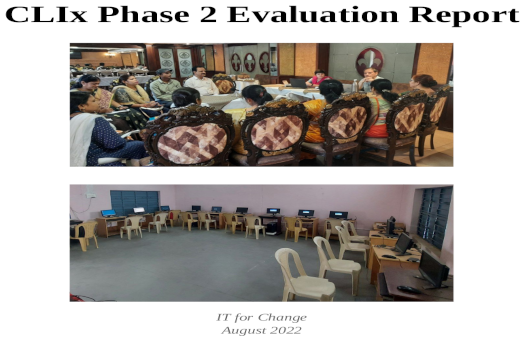The Centre of Excellence in Teacher Education (CETE), Tata Institute of Social Sciences (TISS) launched the Connected Learning Initiative (CLIx) in 2015 with an aim to “improve teaching, teacher professional development and student learning through the use of Information and Communication Technology (ICT)-enabled Open Education Resources (OER), and thoughtful use of interactive technologies”. Phase 1 of CLIx concluded in 2020, and the second phase was initiated with an aim to scale quality teaching-learning using ICT with teacher professional development and curricular integration. Given the unprecedented challenges due to the sudden disruption in teaching-learning processes brought about by the Covid-19 pandemic, several alternate/new strategies were adopted by CLIx to address the needs of school systems. In the interest of understanding the progress made so far on one hand and informing the way forward with the experience and the learnings of the last two years, a third party midterm assessment of the activities of the second phase between April 2020 and March 2022 was undertaken by IT for Change. The evaluation was designed to assess the program implementation in context, identify aspects that have been conducive to the implementation of the program and areas that need improvement and on this basis, provide recommendations for consideration.
The fundamental approaches and strategies of CLIx in terms of promoting teacher collaboration, active and collaborative learning, open software and resources, and state ownership are in the right direction, specially at a time when the whole discourse on EdTech is steering away from core educational values towards “learnification”. The CLIx model is an alternative to this model of ICT integration, and continuedand significantly enhanced investment into the program is crucial to ensure that the principles, processes and products of CLIx sustain in the system.
Key Findings
- In both states, the implementation teams hold an excellent rapport with all stakeholders. At the onset of the COVID-19 pandemic, CLIx pro-actively took measures to respond to the requirements of the department and support thousands of CLIx and non-CLIx teachers, HMs and other stakeholders by conducting trainings to help them deal with the challenges posed by thesudden disruption in teaching-learning.
- Teachers opine that CLIx modules and OERs are well-designed as they are contextual and present content in a way that is engaging for students. However, according to teachers and HMs, thesubject areas and the number of modules per subject are limited and even the ones currently available are not fully in alignment with the new syllabus.
- Several stakeholders reported that while the online trainings and courses were useful, there were limited opportunities for hands-on practice.
- The ICT lab infrastructure, which is a critical component of the CLIx program, is in a less-than-desirable state in both Telangana and Chhattisgarh.
- In Telangana, the district reorganization coupled with teacher transfers has resulted in many of the CLIx trained teachers shifting to non-CLIx schools that do not have functional lab set-ups.Teachers who have not undergone CLIx courses/trainings and who are unfamiliar with the CLIx modules/resources, are using them in the ICT lab on being assigned to CLIx schools. Additionally, several district and sub-district officials have been newly appointed and have not been fully acquainted with the trainings, modules, work and functioning of CLIx.
Key Recommendations
- Continued and significantly enhanced investment into the program is necessary. The credibility that the program and the trust hold with the department must be consciously leveraged to persuade the department to invest in the necessary hardware and teacher preparation based on the needs of stakeholders.
- CLIx offers a sustainable and scalable model that strengthens the capacities in the public education system and necessary investments and support, financial and otherwise, on the part of the government need to be made.
- Supplementary training programs for all stakeholders across the state would be essential to ensuring that the knowledge and capacities built over time through the CLIx program are sustained within the system.
- Design and development of additional CLIx modules covering more topics and subject areas can give teachers further incentive to adopt and utilise the modules and thereby integrate ICT in their teaching learning processes.
- Efforts could be made for teachers to imbibe more deeply the principles behind integrating ICT in education – the need and importance of OERs, sharing and collaboration with peers, etc. so that their pedagogical imagination for ICT in education could expand to include creation and curation of OERs as well.
The report can also be accessed from the TISS website

